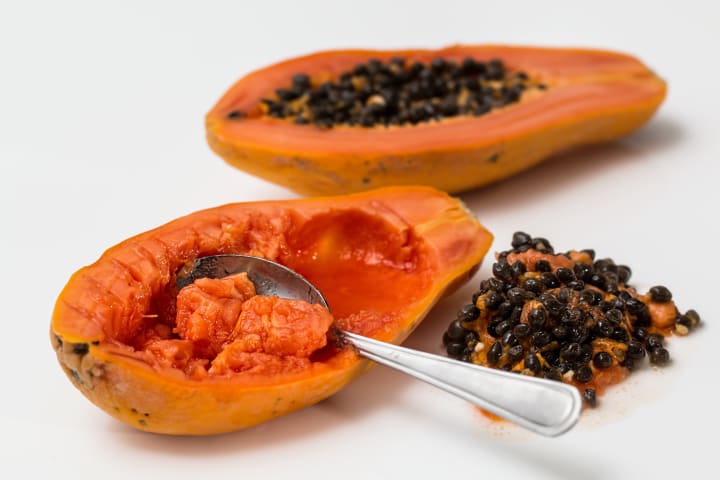What is papaya fruit
what is papaya fruit

What is papaya fruit
Papaya fruit grows in the tropics. Although Mexico is considered the original home of this fruit, India produces most of the amount of papaya in the world. Its production reached five million tons in 2013. This fruit is characterized by its sweet taste, bright color, and ease of inclusion in meals. In addition, papaya gives the body many benefits, such as reducing the risk of heart disease, diabetes, or cancer, and contributes to maintaining healthy skin and hair.
Papaya contains many vitamins and important components for the body, as one papaya fruit weighing 157 grams contains:
The nutritional element is the equivalent amount of the daily need of the body
Fiber 2.7 g 10%
Calcium 31 mg 3.1%
Magnesium 33 mg 8%
Potassium 286 mg 6.08%
Zinc 0.13 mg 0.9%
Vitamin C 95.6 mg 106.2%
Folic acid 58 mcg 14.5%
Vitamin A 1492 IU 30%
Vitamin E 0.47 mg 2.4%
Vitamin K 4.1 µg 5.1%
What are the benefits of papaya fruit?

Papaya contains many nutrients that give it many health benefits such as:
Carotenoids have a powerful antioxidant effect to fight free radicals that cause many diseases such as Alzheimer's, chronic inflammation, and reduce oxidative stress.
The carotenoid reduces the risk of developing asthma in people that consume papaya in good amounts.
Lycopene has an anti-cancer effect, thus reducing the risk of developing it. It also benefits affected patients and slows the progression of cancer.
Lycopene and vitamin C are antioxidants that fight free radicals that are harmful to the skin. These substances help make the skin fresh and younger, help heal the skin from sun damage and fight wrinkles.
Lycopene, vitamin C, and fiber help prevent heart disease.
Potassium reduces sodium absorption, which significantly reduces the risk of cardiovascular disease.
Papain enzyme improves digestion, treats constipation, and relieves symptoms of colon disorders, and the seeds, leaves, and roots help treat ulcers.
Calcium and vitamin K support bone health and reduce the risk of fractures.
Vitamin K enhances the absorption of calcium from the intestines; Which strengthens and supports bone building.
Vitamin A supports hair health, maintains moisture, and promotes the growth of body tissues, including hair and skin.
Vitamin C promotes the building of collagen, which is important for hair and skin.
Zeaxanthin is a powerful antioxidant important for eye health. It is based on filtering blue rays and protects the eyes from its harm.
The existing fiber lowers the level of sugar in people with type 1 and type 2 diabetes
The existing fiber helps to lose excess weight; it gives a feeling of satiety for a long time. In addition, papaya does not contain high calories.
What are the harms of papaya fruit?

Despite the many benefits of papaya fruit, it may be harmful in the following cases:
Allergy to latex in the bark of the fruit: Unpeeled papaya fruit contains this substance, which causes allergic reactions in some people. It causes itching, chest tightness, and chills. In severe cases, it may cause severe shortness of breath or anaphylactic shock. Therefore, it is advised not to eat papaya for people with latex allergy.
Pregnancy: Pregnant women should not eat papaya because latex may cause uterine contractions and lead to premature birth.
What are the ways to eat papaya fruit?
You can enjoy the taste of papaya by eating it in several ways, such as:
Cut the fruit in half and fill each half with yogurt, berries, and nuts.
Prepare the sauce by mixing papaya with tomatoes, onions, lemon and coriander.
Prepare a papaya cocktail by mixing the fruit with coconut milk and ice.
Prepare papaya salad with avocado, cooked chicken pieces, and add olive oil and vinegar.
Prepare papaya ice cream with chia seeds, almond milk and vanilla.






Comments
There are no comments for this story
Be the first to respond and start the conversation.